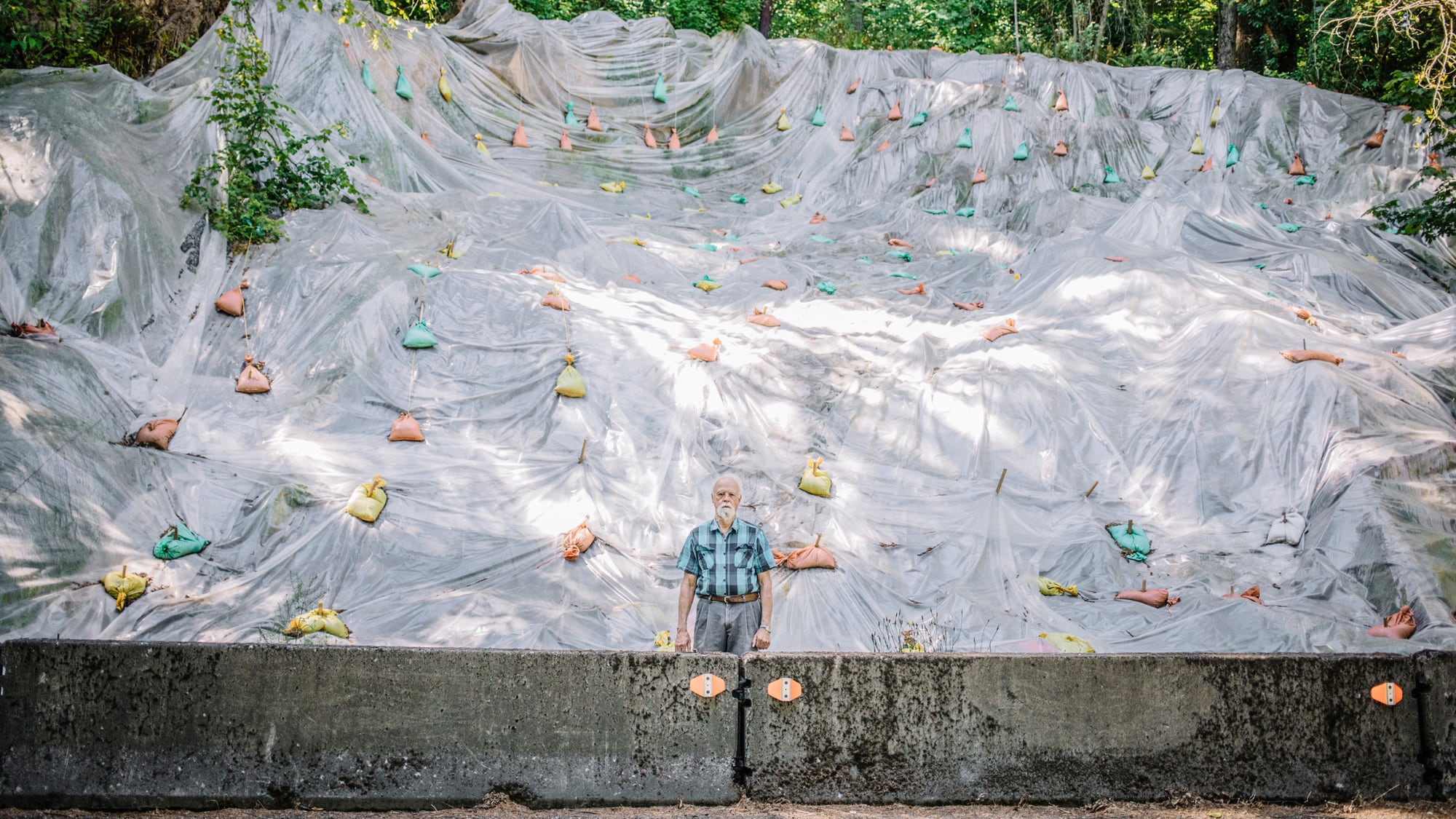Dave Pollock has lived for the past 21 years on his savings and pension from teaching history at Centennial High School.
But last year's record rains could ruin him.
In February 2017, a landslide on the West Hills property he inherited from his parents sent a scree of rocks and mud tumbling onto a curve on Southwest Skyline Boulevard. Now the city of Portland wants to fine Pollock $6,000 for not repairing the landslide damage—and then have him build a $400,000 retaining wall.
Pollock, 76, is not a rich man. He's puzzled why the city wants to blame him for a natural disaster.
"I didn't cut down any trees," Pollock says. "I didn't build any new structures. Nothing has changed on my property since 1937. I don't see why I'm responsible here."
Portland homeowners are still struggling to repair damage from landslides during the winter of 2016-17, which the National Weather Service says was the wettest winter on record. Some, like Pollock, say the city is using the opportunity to make them pay to fix city streets.
Pollock recalls a time when the city paid for the damage caused by landslides along its roads. But with budget woes and severe weather growing more common, the city is not only demanding homeowners pay for repairs, it's placing liens on homeowners' property—including Pollock's—if they don't pony up.
Officials point to city code that allows the Bureau of Development Services to decide when a homeowner should have to pay to repair grading or geologic conditions that affect public roads.
Thomas Ngo, spokesman for the bureau, says the city isn't out to ruin anyone financially.
"It's an unfortunate risk if you have property on the West Hills," Ngo says. "The West Hills are not exactly the most solid ground. Fixing code violations can become a hardship for property owners, but our job is to make sure that life safety, building and zoning codes are being met."

Damage from landslides in Portland could be as high as $81 million in extreme weather years, according to a 2017 study by the Oregon Department of Geology and Mineral Industries.
Portland had more wet days in winter 2016-17 than in any other winter recorded by the National Weather Service. Record levels of rain and melting snow contributed to 71 landslides recorded by the city that winter.
One expert says the way some roads were built in the steep West Hills might be contributing to the problem.
Tom Westover, an engineer with Portland geotechnical engineering firm Landslide Technology, says many of the older roads in the West Hills were built using a "cut and cast" design, in which workers sliced into the hill above the road to create a flat surface, then used the material they cut out of the hill to fill the downside below the road. That material wasn't usually the best thing to prevent erosion. Now, engineers match fill to the specific requirements of each site.
And many of the banks around the roads in the West Hills are just too steep to be stable in intense winter storms, Westover says. Some were originally gravel roads installed by farmers.
"Today, there's a lot more that would need to happen in terms of investigation," Westover says. "For some of these roads, if we were to do it now, it just wouldn't be built."
Pollock says the city tacitly acknowledged its responsibility for the road's structural problems by paying to clean up landslides on his property for more than 60 years.
Officials at BDS and the Portland Bureau of Transportation declined to comment on when city policy changed, but pointed WW to a code amendment in 2009 that clarified property owner responsibility for landslides.
Until the most recent event, Pollock says, the city would automatically come out after a slide and clean up any damage. And in 2003, he says the city paid to cover the slope in a layer of small boulders called "riprap." (City officials say they don't have any record of that.)
This time, the city waited six months after the February 2017 slide—then started billing Pollock $565 per month for failing to establish a plan for repairs. That amount has ballooned to $6,000, because Pollock hasn't devised that plan. He can't afford the $400,000 retaining wall.
Pollock isn't the only one in this situation. Out of 71 documented landslides in Portland in the winter of 2016-17, the Bureau of Development Services issued notices to 42 homeowners requiring them to stabilize potentially hazardous land.
The bureau said it levied fines against eight property owners for foot-dragging on repairs.
That includes a prominent company. In July 2017, the city placed a lien on Adidas' North Portland campus for its failure to immediately repair damage from a Feb. 17, 2017, landslide. Adidas declined to describe the scope of the landslide or comment on the lien.
In emails obtained by WW, city geotechnical engineer Ericka Koss told a homeowner she was "sincerely sorry" there was no public money available to help fund such repairs but that "the risk of losses due to landsliding is borne by the homeowner."

South of Pollock's property, where Southwest Broadway dead-ends in the West Hills, homeowner Mark Melman says he has racked up city fines totaling nearly $5,000 after a landslide on the empty lot he owns across the street from his home.
Melman says he has already paid $35,000 for a geoengineering report and temporary measures to stabilize the slope. He worries that a permanent fix will cost much more.
Melman says the 2017 snowstorms that shut down the city and prompted Oregon Gov. Kate Brown to declare a state of emergency caused the landslide at his place.
Melman says the city plowed the snow in front of his house on Broadway, piling it up into huge drifts on each side of the road. He says it took a week for those piles to melt, and all that flowing water took a slice of the downhill slope across the street from Melman's house with it.
"I feel like the city is asking me to stabilize Southwest Broadway," Melman says. "I don't think I should be responsible for the structural support of the roadway."
Both Pollock and Melman say their insurance providers refused to cover landslide damage.
Pollock says he might end up paying as much to repair the landslide as his property is worth.
As a last resort, he hired a lawyer to consider suing the city. Attorney Brooks Foster said he and Pollock discussed two unsavory possibilities: bankruptcy or offering to deed his property to the city in lieu of paying for repairs. They discarded both options, and Pollock says he doesn't know what to do next.
"I did nothing to cause the slide," Pollock says. "The road was there before me, and I did not compromise the slope. I feel like they are forcing me to give up my retirement savings."

